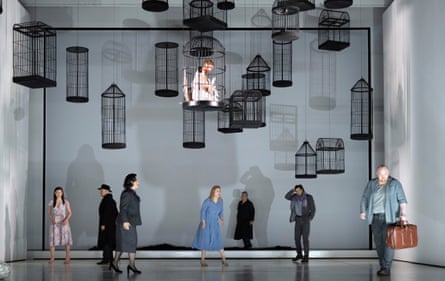Opera lover or not, you might have a mental image of Glyndebourne festival opera: posh frocks, champagne and picnic hampers, idyllic Sussex. It’s the UK’s most famous opera festival and it’s unabashedly deluxe. Except, that is, when it’s pouring, when severe weather warnings threaten damage to “temporary outdoor structures” and when a global pandemic continues to wreak havoc. “It’s Sod’s law, isn’t it?” one of the parking attendants mused, as we watched punters make a dash for the new, wind-buffeted marquees. Black-tie finery was buried under duvet coats, chunky knitwear, cagoules and hats. By the dinner interval, even the maître d’ was wearing an anorak.
Sideways rain may not be ideal for al fresco dining but could hardly be bettered as a prelude to Janáček’s heartbreakingly dismal Kát’a Kabanová. It was a raw, bracing piece with which to reopen after a cancelled 2020 season. As Glyndebourne’s chairman, Gus Christie, reminded the 50%-capacity audience before curtain-up: “It really is a minor miracle that we’ve got here.”
To be clear: Kát’a Kabanová is not a feelgood opera. Yet if watching a work about a woman trapped in a miserable marriage, who falls in love and is driven to kill herself could ever be described as pleasurable, this opening night came close.
Damiano Michieletto’s new production is stark: a clinical white-box set with movable walls, sensitively lit by Alessandro Carletti, and a forbidding-looking white sofa. There are a few details showing us what we might otherwise imagine: a gradual accumulation of birdcages casting intricate shadows; a small boulder (Kát’a’s guilt weighs on her like a stone, she says); a black shroud; a group of topless male dancers as the angels she claims to have seen. Do we need such heavy hints about how to understand the libretto’s symbolism? An even sparer vision might ultimately have revealed more. But the stage pictures are beautiful and the violence of the final scene, birdcages crashing to the floor as Kát’a kills herself, is stunning.

Musically, it was superb. As Kát’a, young Czech soprano Katarina Knezikova is an unshowy, mellow-sounding heroine. David Butt Philip’s Boris, her lover, was gently hapless, while as her feeble husband Tichon, Nicky Spence was all twitching neurosis – still scarier for being coupled to his ultra-powerful tenor. Katarina Dalayman’s Kabanicha (one of opera’s most nightmarish mothers) was fearsome, her mezzo dripping with velveteen nastiness. Aigul Akhmetshina and Thomas Atkins both had vocal power to burn as the more hopeful young couple Varvara and Kudrjas.
It took a moment to acclimatise to the sound of the reduced (and socially distanced) London Philharmonic Orchestra, the climaxes of Janáček’s phrases less voluptuous than expected. But under music director Robin Ticciati any loss in symphonic oomph was counterbalanced by exquisite ensemble playing and pacing that made space for moments of pain and beauty alike.
